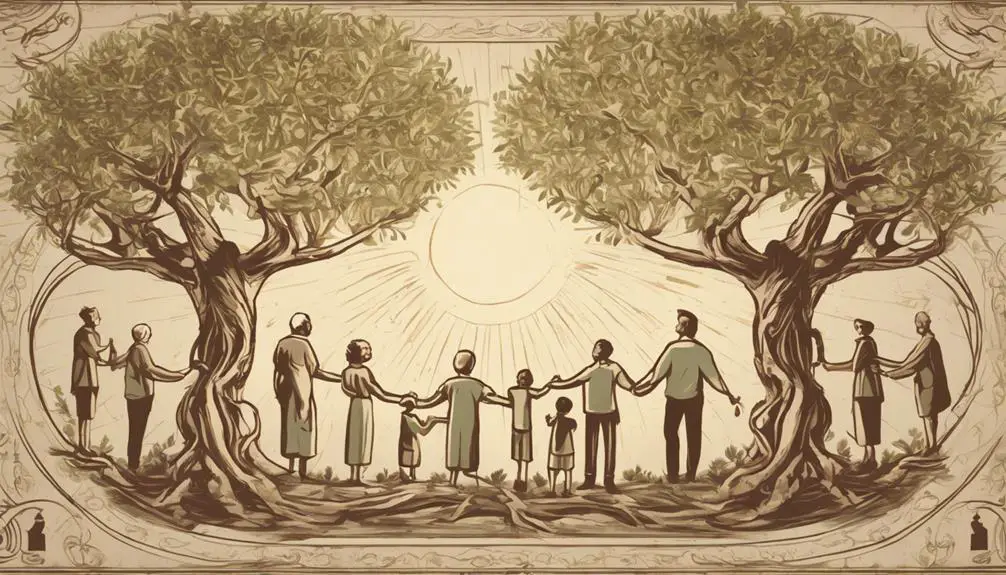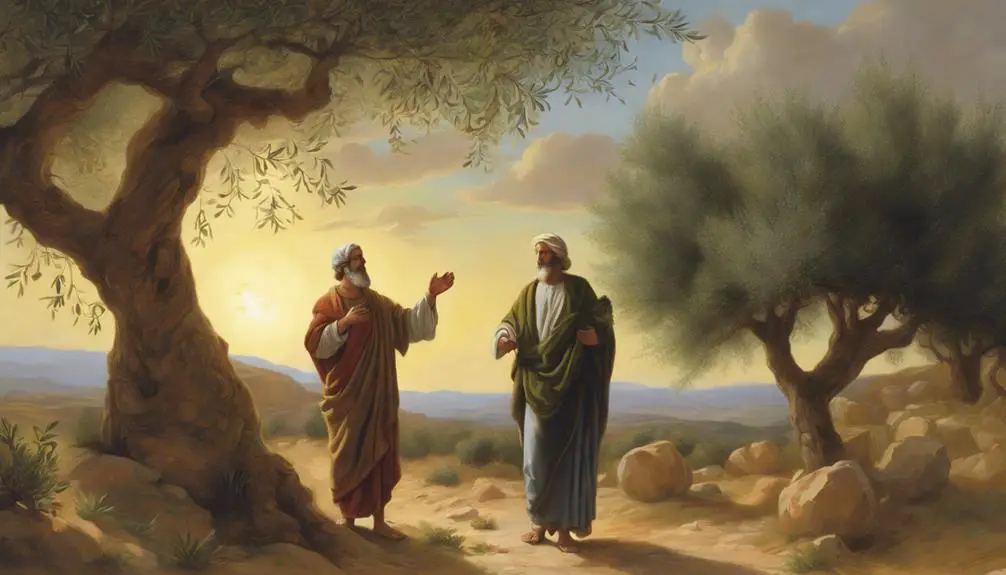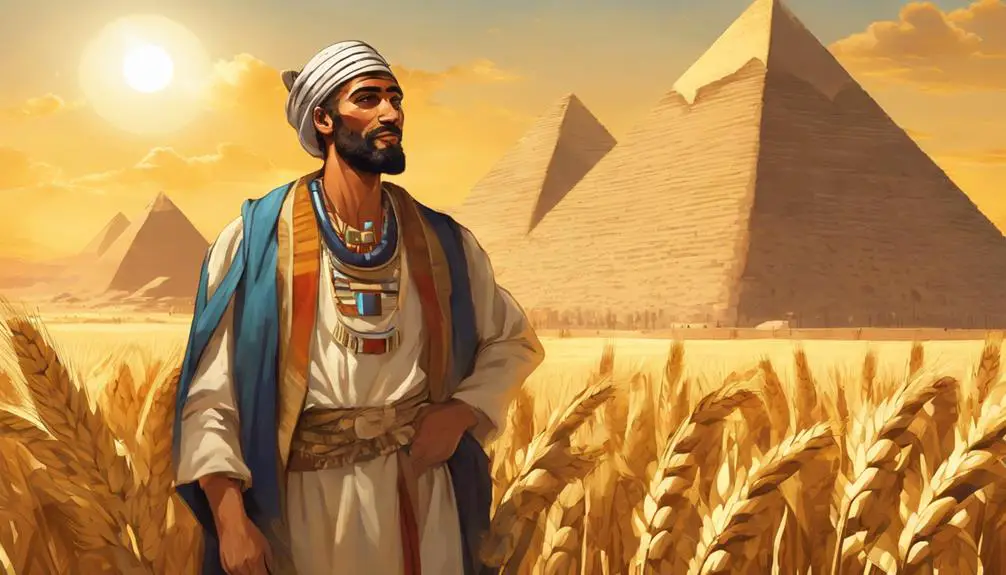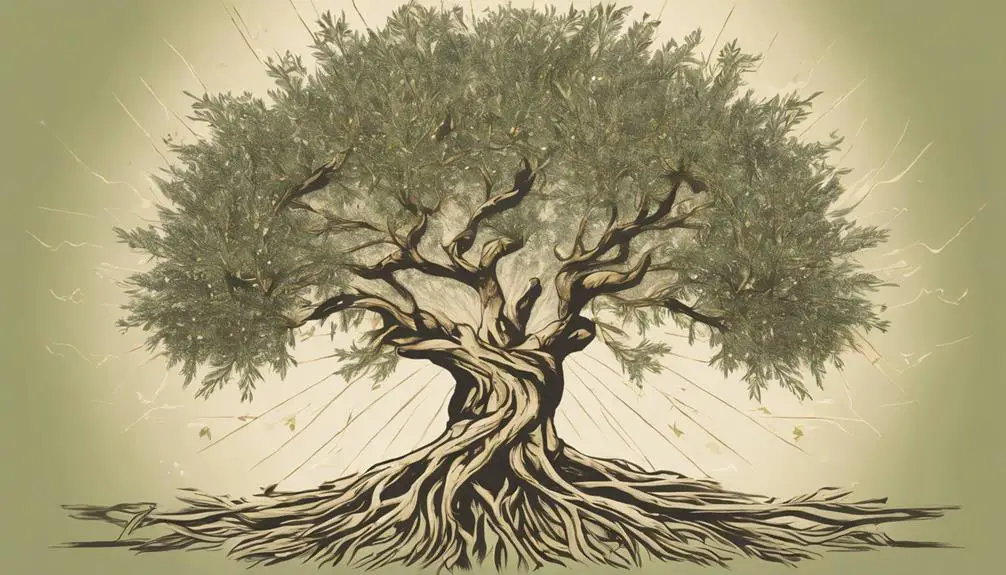Explore the profound legacy of generational blessings in the Bible and how they shape destinies, inviting you to ponder your own inheritance.

Generational Blessings in the Bible
Interestingly, you've likely heard about the concept of generational blessings without realizing its deep roots in the Bible. The stories of Abraham, Isaac, Jacob, and Joseph, among others, highlight how blessings are passed down through generations, often intertwined with challenges and divine promises.
These narratives aren't just ancient history; they hold profound lessons on faith, perseverance, and the impacts of our actions beyond our lifetime. As you reflect on these biblical examples, you might find yourself pondering the legacy you're creating and how it could bless or instruct future generations.
What will your story inspire?
Key Takeaways
- Generational blessings are rooted in divine covenants and promises, influencing future lineages.
- Faith, obedience, and human agency play crucial roles in receiving and perpetuating blessings.
- Leadership, wisdom, and adaptability are key to managing and expanding generational blessings.
- Spiritual identity and legacy are shaped by individual destinies and divine favor across generations.
The Covenant With Abraham

In the biblical narrative, God's covenant with Abraham marks a pivotal moment, establishing a foundational promise that echoes through generations, directly impacting his descendants with blessings of land, nationhood, and a profound relationship with the divine. This covenant isn't merely a contract; it's a testament to Abraham's unwavering faith in the face of uncertainty. You can't discuss this covenant without delving into Abraham's faith, which is both the bedrock and the catalyst of this divine promise. His faith wasn't passive; it was active, demonstrated through obedience and trust in God's commands.
The sacrificial test, wherein Abraham was asked to sacrifice his son Isaac, is perhaps the ultimate expression of this faith. It wasn't just about obedience; it was a test of trust, surrender, and the belief that God's promises would hold true despite the immediate circumstances. This moment underscores the depth of Abraham's commitment and trust in God, showcasing a faith that transcends understanding. It's this faith that activates the covenant, ensuring that the blessings promised to Abraham wouldn't only be realized in his life but would also set a precedent for how God interacts with humanity, marking a lineage blessed by divine favor and promise.
Isaac's Inherited Promises

As the beneficiary of Abraham's covenant with God, Isaac stands as a pivotal figure, inheriting promises that would shape the destiny of a nation and echo through history. You're observing a narrative that's not just about land and multitude but also about the personal trials and triumphs that sculpt the contours of biblical history. Isaac's life is a testament to the complexity of carrying forward a divine promise.
The narrative thickens with Esau's rivalry and Rebekah's guidance, elements that underscore the human dimension within these divine transactions. Esau's rivalry isn't merely a family feud; it's a pivotal juncture that illustrates the weight of the inherited blessings and the lengths to which individuals will go to secure or sabotage divine promises. Rebekah's guidance of Isaac, on the other hand, reveals the intricate maneuvers often required to navigate the path laid out by divine promises. Her influence isn't just maternal; it's strategic, ensuring that the blessings find their intended recipient in accordance with God's plan.
Isaac's journey, marked by these familial dynamics, showcases the multifaceted nature of inheriting and fulfilling divine promises. It's a narrative that intertwines divine destiny with human agency, highlighting the enduring legacy of faith, struggle, and providence.
Jacob's Blessing and Legacy

Jacob's ascension to receive his father's blessing, a pivotal moment in biblical history, not only perpetuates the lineage of Abraham's covenant but also introduces a complex legacy marked by divine favor and human scheming. This event is intertwined with deep familial strategy, where Jacob, leveraging his brother Esau's immediate needs, secures the birthright trade. This maneuver, while ensuring his place in the covenant, casts a long shadow over his legacy.
From Esau's perspective, this exchange represents a pivotal loss, underscoring the transactional nature of their relationship and the weight of the birthright in their cultural context. Jacob's actions, fueled by ambition and his mother Rebekah's guidance, set a precedent for future generations about the lengths to which one might go to fulfill divine prophecy and personal destiny.
This story showcases the complexity of blessings in the biblical narrative. They're not just divine endorsements but are deeply entangled with human actions and decisions. Jacob's journey, marked by this initial act of securing his father Isaac's blessing through subterfuge, reveals a multifaceted inheritance—combining God's promises with the realities of human conduct and ambition.
Joseph: Prosperity in Egypt

Joseph's rise to power in Egypt, marked by his adept interpretation of Pharaoh's dreams, showcases a remarkable transition from slave to prime minister, revealing the intricacies of divine favor intertwined with human wisdom and resilience. This narrative isn't just a tale of individual prosperity; it's an exploration of how divine guidance, manifested through dream interpretations, can lead to unprecedented societal impact. Joseph's ability to decode the impending famine from Pharaoh's dreams and his subsequent strategy to store grain underscores the role of foresight and planning in governance.
Moreover, Joseph's tenure as prime minister underlines the significant Egyptian influence on his life and leadership style. He didn't merely adapt to Egyptian culture; he thrived, leveraging his position to ensure not just the survival but the prosperity of both Egypt and his family. His strategies during the famine exemplify a blend of divine wisdom and practical governance, setting a precedent for leadership that transcends cultural and national boundaries.
In essence, Joseph's story is a testament to the power of faith, intellect, and adaptability in overcoming adversity. His legacy is a fascinating case study in how Egyptian influence and divine insight through dream interpretations can forge a path to prosperity and deliverance.
The Legacy of David's Line

Transitioning from the narrative of Joseph's prosperity in Egypt, we now explore the enduring legacy of King David's lineage, a cornerstone of biblical history that shaped the future of an entire nation. This legacy, marked by divine promises and profound achievements, profoundly influenced the spiritual and political landscape of Israel.
- Solomon's wisdom: Solomon, David's son, is celebrated for his unparalleled wisdom, granted by God. His ability to rule with discernment and justice exemplifies the divine favor promised to David's line. Solomon's wisdom not only solidified the kingdom's internal affairs but also elevated its international standing.
- Temple construction: Solomon's most monumental achievement was the construction of the Temple in Jerusalem. This sacred structure symbolized God's permanent presence among His people and fulfilled a divine promise made to David. It became the spiritual heart of Judaism, influencing worship practices for generations.
- Dynastic promise: The promise of an everlasting dynasty to David, a covenant that God wouldn't break, underscores the unique role of David's lineage in biblical history. This promise ensured that despite challenges, the legacy of David's line would remain central to Israel's identity and faith.
Analyzing the legacy of David's line reveals how individual destinies can shape a nation's spiritual trajectory, reinforcing the theme of generational blessings throughout the Bible.
Frequently Asked Questions
How Do Generational Blessings Relate to Modern Christian Practices and Beliefs Outside of These Specific Biblical Lineages?
You might wonder how ancient concepts like generational blessings fit into today's Christian practices.
Modern interpretations often see these blessings as symbolic, influencing how faith and values are passed down through families.
Cultural adaptations have also shaped how these ideas are integrated into worship and community life.
Essentially, the belief in generational blessings has evolved, finding relevance in contemporary Christian beliefs by emphasizing the spiritual legacy over the literal lineage.
Can Individuals Today Directly Inherit Generational Blessings, or Are They More Symbolic in Nature?
You're navigating the complex landscape of inheritance dynamics, pondering if you can directly inherit blessings or if they're more symbolic.
It's essential to understand that while direct lineage blessings might seem appealing, modern interpretations lean towards symbolic meanings. This shift encourages a broader, more inclusive understanding, allowing individuals to find personal significance and growth.
Symbolic interpretations don't dilute the power of these blessings; instead, they adapt their relevance to contemporary life.
Are There Instances Where Generational Blessings Skipped a Generation or Were Revoked Due to Disobedience in the Bible?
Yes, in the Bible, there are instances where divine intervention led to generational blessings being skipped or revoked due to disobedience, highlighting the impact of ancestral sins.
This demonstrates a complex relationship between faithfulness and divine favor. For example, King Saul's disobedience resulted in his dynasty not continuing, showing that blessings could indeed be conditional and not automatically passed down, underscoring the importance of individual actions and divine judgment.
How Do the Concepts of Generational Blessings Compare and Contrast With the Idea of Generational Curses Found in the Bible?
Analyzing biblical texts, you'll find that generational blessings and curses are deeply interwoven with cultural perspectives and historical context. While blessings reward faithfulness, enhancing prosperity and favor through generations, curses result from disobedience, casting long shadows over descendants.
The contrast lies in their origin and intent; blessings aim to uplift, curses to discipline. Yet, both serve as powerful reminders of the consequences of one's actions, echoing through generations.
In What Ways Can Non-Israelites or Individuals Outside of These Biblical Families Claim or Partake in Generational Blessings According to Scripture?
To claim or partake in generational blessings, scripture indicates that non-Israelites, through faith and acceptance of God's promises, can be grafted in, reflecting Gentile inclusion and covenant expansion. Essentially, by embracing the faith of Abraham, you're welcomed into this spiritual lineage, irrespective of your biological ancestry.
This process highlights a broader, inclusive approach, ensuring that all who believe have access to these blessings, breaking down barriers between Jews and non-Jews.
Conclusion
Throughout the biblical narrative, you've seen how generational blessings unfold, starting with Abraham's covenant, flowing through Isaac and Jacob, and culminating in Joseph's prosperity and David's lineage. These stories aren't just historical accounts; they're blueprints demonstrating how faithfulness and divine favor pass through generations.
Analyzing these narratives, it's clear that these blessings, while unique in their context, share a common thread of promise, faith, and fulfillment, underscoring the profound impact of spiritual inheritance in shaping destiny.



Sign up